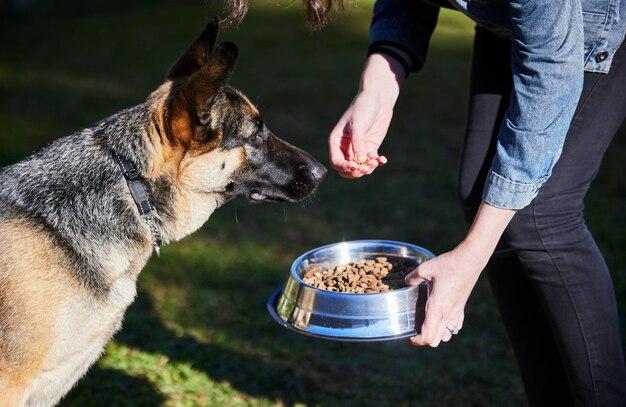German Shepherd Food: What's the Best Food for German Shepherd Dogs?

German Shepherds are among the most popular dog breeds worldwide, known for their intelligence, loyalty, and versatility. Whether they’re serving as police dogs, search-and-rescue workers, or loyal family companions, their dietary needs are critical to their overall health and performance. If you’re a proud German Shepherd food owner, understanding what constitutes the best food for your furry friend is vital. At My Petpit, we’ve researched and compiled the essential details to help you make informed decisions about their diet.
What Makes a Good Diet for German Shepherds?
German Shepherds are large, active dogs with unique dietary requirements. Their muscular build and high energy levels mean they need a diet rich in proteins, healthy fats, vitamins, and minerals. High-quality protein sources like chicken, beef, fish, or lamb are crucial for muscle development and repair. Fats, such as omega-3 and omega-6 fatty acids, are vital for maintaining healthy skin and a shiny coat. These fats also provide the energy required for their active lifestyle.
Carbohydrates are another important component of their diet. While they provide a quick energy source, it’s essential to choose whole grains and vegetables over processed fillers to avoid digestive issues. German Shepherds are also prone to certain health conditions, such as hip dysplasia, arthritis, and digestive sensitivities. Including foods rich in glucosamine, chondroitin, and probiotics can help prevent or manage these conditions. A balanced diet tailored to their specific needs can ensure a long, healthy life for your German Shepherd.
Top Commercial Food Options for German Shepherds
Choosing the right commercial food for German Shepherd dogs can be overwhelming, given the many options available. Look for high-quality, breed-specific dog foods that meet their nutritional requirements. Brands like Royal Canin, Hill’s Science Diet, and Blue Buffalo offer formulas designed for large, active breeds. These products often include a balanced mix of proteins, fats, and essential nutrients to support your dog’s overall health.
For puppies, opt for a formula specifically designed for large-breed puppies. These formulations usually contain controlled levels of calcium and phosphorus to support healthy bone development. Adult German Shepherds benefit from diets rich in protein and moderate in fat to maintain their muscular physique. For senior dogs, look for food enriched with joint supplements and antioxidants to support aging joints and overall vitality.
It’s important to read the ingredient list carefully and avoid products with artificial additives, fillers, and low-quality by-products. Consult your veterinarian to determine the best commercial food option for your German Shepherd’s age, size, and health needs.
Homemade Food for German Shepherds
Homemade diets are an excellent alternative for what's the best food for german shepherd owners who prefer to have complete control over their dog’s meals. A well-prepared homemade meal allows you to select high-quality ingredients and tailor the nutrition to your dog’s specific needs. For example, a balanced homemade meal might include cooked lean meats like chicken or turkey, brown rice or quinoa for carbohydrates, and vegetables like carrots or spinach for essential vitamins and minerals.
Adding supplements like fish oil for omega fatty acids and calcium for strong bones can enhance the meal’s nutritional value. However, preparing a homemade diet requires careful planning to ensure your German Shepherd receives all the necessary nutrients. Avoid toxic ingredients like onions, garlic, chocolate, and grapes, as they can be harmful to dogs.
Before transitioning to a homemade diet, consult with a veterinary nutritionist to create a balanced meal plan. Regular check-ups are also essential to monitor your dog’s health and adjust their diet as needed. While homemade food can be time-consuming to prepare, many owners find it a rewarding way to keep their German Shepherd healthy and happy.
Common Feeding Mistakes to Avoid
Feeding your German Shepherd the right way is just as important as choosing the right food. Overfeeding is a common mistake that can lead to obesity and related health issues. Always measure your dog’s food portions according to their age, weight, and activity level. Avoid giving them table scraps or foods high in fat and salt, as these can cause digestive upset or pancreatitis.
Another mistake is neglecting their water intake. German Shepherds need plenty of fresh water to stay hydrated, especially after exercise. Ensure their water bowl is always clean and filled. Additionally, avoid feeding them at irregular intervals or too close to their exercise sessions, as this can increase the risk of bloating—a serious and sometimes fatal condition common in large breeds.
Finally, remember that every German Shepherd is unique. Their dietary needs may vary based on factors like age, health, and lifestyle. Regular veterinary consultations are crucial to assess their nutritional needs and make adjustments as necessary. With proper feeding practices, you can ensure your German Shepherd thrives in every stage of life.
Conclusion
Choosing the best food for your German Shepherd is a vital part of ensuring their health and happiness. Whether you opt for high-quality commercial dog food or prepare homemade meals, it’s important to focus on balanced nutrition tailored to their specific needs. Avoid common feeding mistakes and consult your veterinarian regularly to keep your furry friend in top shape.
At My Petpit, we’re dedicated to helping pet owners provide the best care for their beloved animals. By understanding your German Shepherd’s dietary requirements and making informed choices, you can enjoy many happy, healthy years together with your loyal companion.
- Art
- Causes
- Crafts
- Dance
- Drinks
- Film
- Fitness
- Food
- Games
- Gardening
- Health
- Home
- Literature
- Music
- Networking
- Other
- Party
- Religion
- Shopping
- Sports
- Theater
- Wellness


